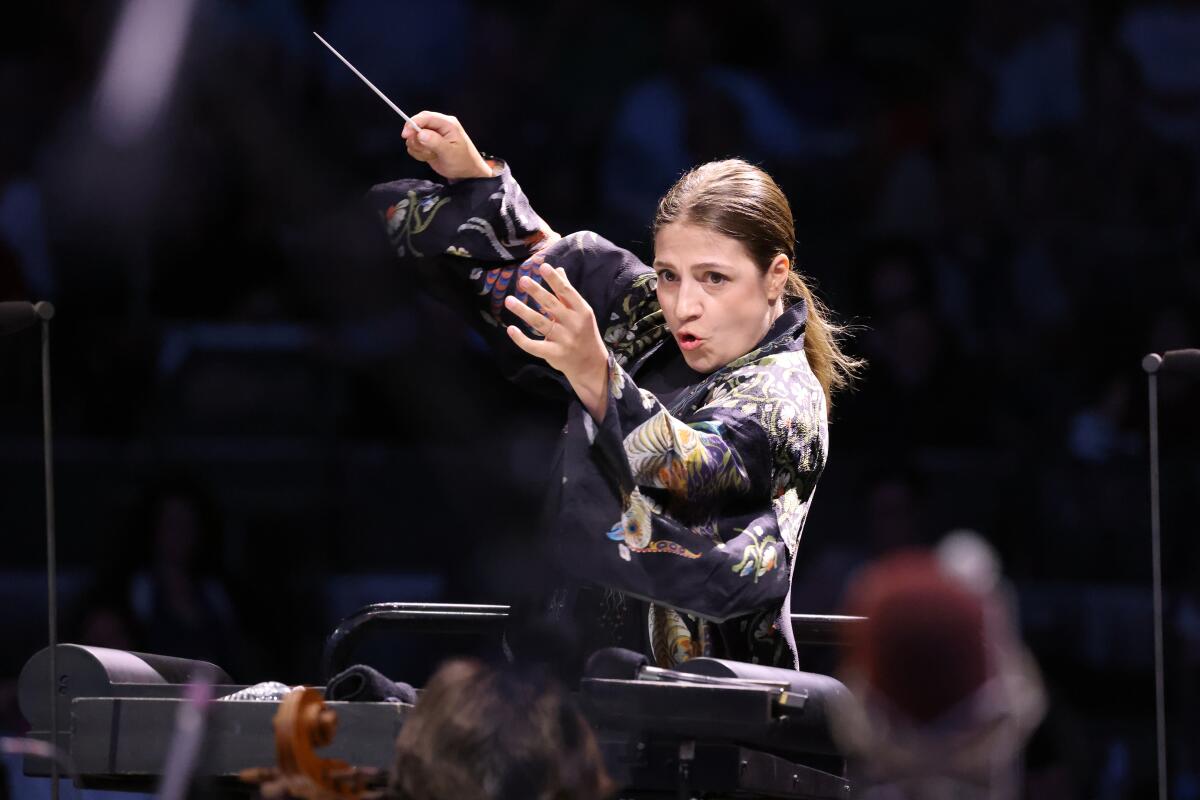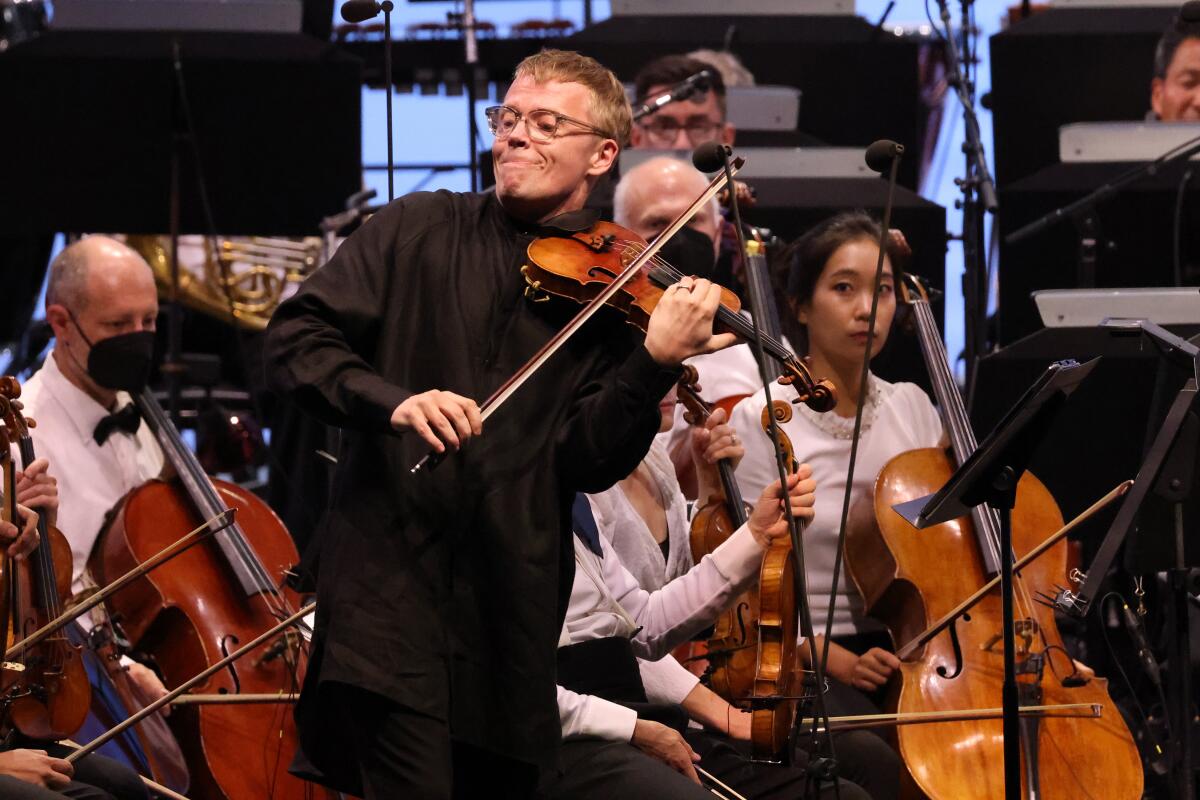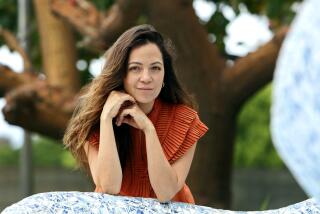Review: Dalia Stasevska’s Hollywood Bowl debut reveals what all the fuss is about

The Hollywood Bowl has spent the first month of its 101st season with the Los Angeles Philharmonic reimagining and reinventing the orchestra‚Äôs long history in the famed amphitheater. It had the incomparable assist of Gustavo Dudamel, the most Bowl-happy major conductor since the flamboyant Leopold Stokowski began appearing in the 1930s. It‚Äôs been a splendid month of Bernstein, Beethoven and the movies, of Wagner newly animated, the Paris Opera Ballet and, thanks to L.A. Phil resident conductor Paolo Bortolameolli, a revived Saint-Sa√ęns.
Now comes another Hollywood Bowl tradition, an often more problematic one. For the rest of August, the L.A. Phil will be primarily in the hands of conductors making their debuts with the orchestra.
Beginning in the 1950s, management has used the summer concerts as a fail-safe way to try out emerging conductors. There is little economic risk, their fees being lower at this stage in their careers. It‚Äôs but a day in the life of the orchestra ‚ÄĒ a morning rehearsal and the evening concert. Repertory is usually so familiar that the orchestra can wing it if necessary. The crowd, furthermore, may not mind all that much, what with the pleasures of a picnic and a night under the stars and still some dollar seats in a beloved venue (ignoring the less pleasurable traffic and parking).
For the young conductor, however, the safety net has as many holes as thinly sliced Swiss cheese. Last season became an occasion for giving former Dudamel fellows their first Bowl date, so they at least knew the orchestra, the acoustics and the daunting scene. This year, the guest conductors are not family, although all the debutants are already well along on their career paths.
Tuesday night saw the belated appearance of Dalia Stasevska, who had been slated to make her Bowl debut in the pandemic-canceled season two summers ago. Although born in Ukraine, she emigrated to Finland when she was 5, and has now entered the ever-growing ranks of Finnish conductors of all generations. In Finland, Stasevska is music director of the Lahti Symphony Orchestra, one of the country’s finest, and is also royalty, having married Sibelius’ great-grandson, the eclectic electric bassist of the Finnish power metal group Stratovarius and an intriguing composer in his own right.
As principal guest conductor of the BBC Symphony Orchestra, Stasevska has already passed a trial by fire: She conducted the orchestra in the Last Night at the Proms in September 2020. A difficult enough assignment at any time, this raucous populist London tradition always ends with ‚ÄúRule, Britannia!‚ÄĚ and ‚ÄúLand of Hope and Glory‚ÄĚ sung by a large chorus and 5,000 spectators.
That year, a reduced, distanced orchestra and chorus was required, and the concert was broadcast without a live audience. The BBC Symphony decided that COVID-19 restrictions made the singing of those numbers impractical, but there was also nervousness about how the musical numbers represented colonial Britain, particularly during that summer of international racial reckonings. Stasevska, who is a vocal proponent of Black Lives Matter but who was not involved in the decision, got the blame and threats on social media. Boris Johnson was among those who insisted that lyrics be reinstated, and they were. Stasevska impressively soldiered on and led an unusually judicious virtual Proms.
A Bowl debut might hardly seem intimidating after that. Stasevska confidently strode onstage Tuesday and began with Anna Meredith‚Äôs exciting, colorful ‚ÄúNautilus,‚ÄĚ inspired by the composer stomping on the beach in her native Scotland. Thomas Ad√®s had launched the L.A. Phil‚Äôs Gen X festival with it in April, and at the Bowl the five-minute score, which opens sounding like a stuck-record brilliant brass fanfare, became a compelling wow moment as delivered with Stasevska‚Äôs dynamic energy.
The promising ‚ÄúNautilus‚ÄĚ broke the ice for Stasevska before she proceeded to Iceland. Five years ago, Dudamel premiered Icelandic composer Dan√≠el Bjarnason‚Äôs ‚ÄúScordatura,‚ÄĚ a violin concerto written for Finnish violinist Pekka Kuusisto. Well, it just so happens that three weeks ago, Stasevska conducted a Proms concert that mixed Icelandic and Russian composers.

‚ÄúScordatura,‚ÄĚ which begins strangely with the violinist playing a duet with himself, whistling while plucking strings of his violin, is an enthralling vehicle for Kuusisto. The violinist has a winning aspect, all but made for the Bowl‚Äôs large video screens, of being an old-school nonchalant virtuoso able to effortlessly toss off anything while at the same time demonstrating, through vivid facial expression, emotional entrancement.
Likewise, Bjarnason’s concerto is both cool and hot. Melodies float like shards of ice on a cold sea, but there is lightning and thunder in stormy orchestral attacks that lead to Kuusisto’s startled, breathtaking cadenzas. Stasevska boldly egged the orchestra on.
She then, after intermission, boldly egged the orchestra on in Dvorák’s Eighth Symphony. That she could create a striking interpretation with so little rehearsal turned out, however, more extraordinary than maybe advisable. This is a symphony the orchestra knows well. It has recorded the work three times, thrillingly under Zubin Mehta, suavely under André Previn and, in an exceptional new release, grippingly under Dudamel.
Stasevska led as though she was still stomping on the Scottish beach. Every big effect was just that, a big effect, with thumped-out rhythms. She regularly treated warmly expressive lyric passages as theatrically sudden pauses for slowly drinking in a beauteous sight before once again briskly moving on. The L.A. Phil did as Stasevska commanded, but one sensed a kind of bristling from the players, as though they were not invited into the picture. The ensemble playing was tense. The effects became predictable.
The slow movement proved the most interesting. I don’t know whether there is such a thing as a Finnish Dvorák, but Stasevska’s changes of gear between quiet passages and loud began to sound intriguingly like a Sibelius soundscape. But even here the Bowl undid her thanks to a helicopter circling overhead throughout the movement.
Stasevska returns to the L.A. Phil in March, when she will have the opportunity to conduct Sibelius in Walt Disney Concert Hall under likely more inviting conditions. The parade of conductors giving the Bowl a whirl for the first time includes Lina Gonz√°lez-Granados (Aug. 11), Louis Langr√©e (Aug. 16), Joseph Young (Aug. 18) and another young Finn, Eva Ollikainen (Aug. 30 and Sept. 1). Meanwhile, a young conductor who made her Bowl debut last summer, Marta GardoliŇĄska (Aug. 25), has been invited back.
More to Read
The biggest entertainment stories
Get our big stories about Hollywood, film, television, music, arts, culture and more right in your inbox as soon as they publish.
You may occasionally receive promotional content from the Los Angeles Times.











